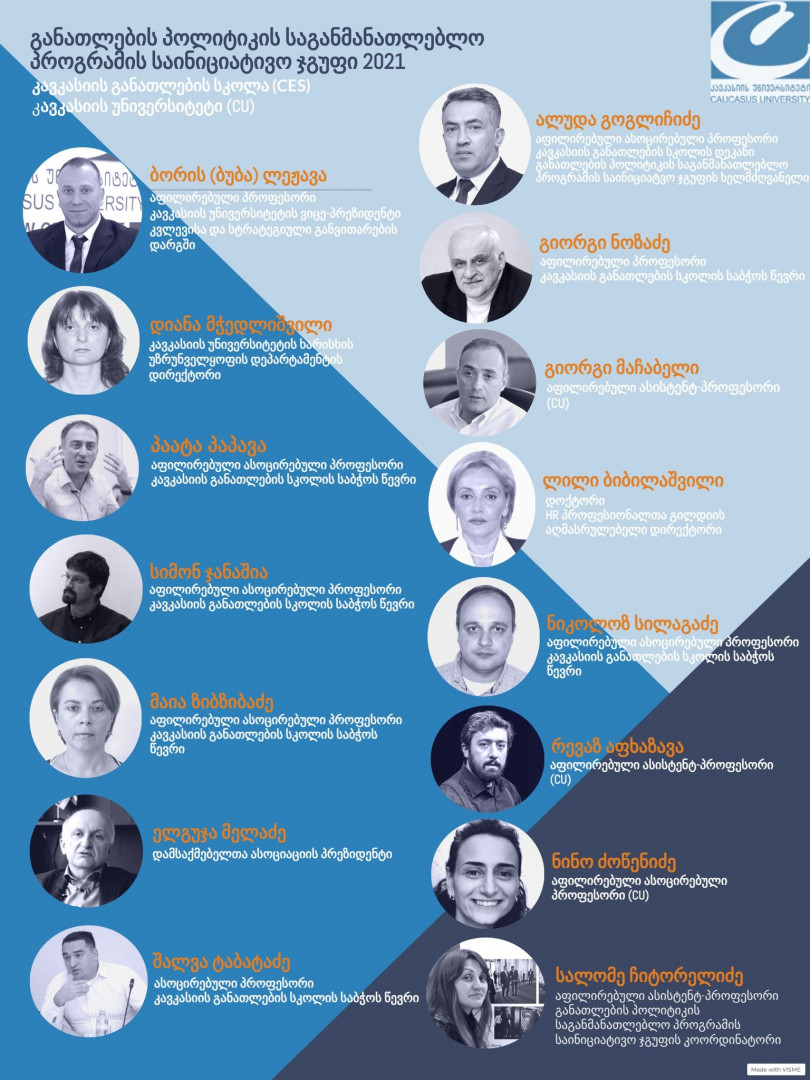On December 31, 2021, LEPL - National Center for Educational Quality Enhancement registered the project - Sectoral Characteristics of the Education Policy Education Program, which aims to add the field of education policy learning in the field of study classifier, prepared by the Caucasus University Education School.
The need to develop the sectoral character of education policy was primarily due to the analysis of international experience. As far back as the 1960s, American professors of political science, including Harold Lasswell and Aaron Wildavsky, decided that: an in-depth and critical analysis of the decisions made by the US government, the policies developed by them and the evaluation of their results based on data was needed and that this required completely different, new types of education and training programs. The main target of their criticism at the time was the federal reform program "Great Society", which aimed to implement reforms in various fields, including education. As a result, almost six decades ago, academic public policy programs were established in the United States with the mission of training Policy Analysts capable of critically analyzing government decisions; Developing alternative approaches to solving problems in the field - assessing their consequences and risks; Facilitating better informed decision making.
The historically important role of education in US social and economic life, which has been further enhanced by the above reforms, has contributed to the development of education policy analysis. There has been a significant increase in the focus on education policy analysis in Europe, especially since the Lisbon Strategy and the Bologna Process. The EU aimed to develop a knowledge-based economy, one of the main drivers of which would be education.
As a result, education policy became one of the directions of public policy, which was followed by the creation of educational programs. As in the case of public policy programs, these programs aim to train professionals and industry leaders who will be able to critically analyze education policy issues, develop ways to address challenges, and make decisions in the face of persistent shortages of information and ambiguity.
The challenges faced by American and European educators in their time are even more acute in the case of Georgia. The country's difficult past, difficult social, economic, political or geopolitical situation; Numerous problems with quality in education, innovation, methods and approaches, governance systems and practices, values and standards; "Lost Generations" and low competitiveness in the world labor market; Many half-implemented, yet-to-be-implemented or unimplemented reforms; Fundamental but at the same time painful changes that are important for a country that wants to transform its inherited post-Soviet education system in a way that promotes its own independence, democratization and development
Added to this are the global challenges facing both the developing and the developed world alike. All this requires well-informed decisions and education policies developed and implemented as a result of proper analysis.
However, unlike the US and European countries, we do not yet have the mechanisms - i.e. appropriate educational programs in the country - to provide them. Thus, given the success of Western countries and the challenges we face, the initiative group of Caucasus University, Caucasus Education School, considered it important to create education policy education programs that provide critical analysis of education policy issues, problem-solving strategies, and training of professionals needed to improve the quality of evaluations and decisions made. For this purpose, the Sectoral Characteristics of Education Policy project has been developed; in it, the minimum competencies of the holder of the relevant qualification are defined, which should ensure the formation of the academic community's unified vision of the academic standard and prepare a solid foundation for the teaching process.
The initiative was preceded by consultations with former and current members of the legislature and executive branch, as well as with representatives of academia and the private and non-governmental sectors involved in education policy issues.
The consultation revealed: "Most of us agree that we lack the knowledge and experience needed to analyze education policy and make well-informed decisions—the same knowledge and experience that successful Western countries have long accumulated. We agree that it is important to share their formula for success. "
In addition to the consultation meetings, the public opinion polling team also conducted an online opinion poll. 53.1% of respondents are employed in the public sector, 33.3% in the private sector, and 13.6% of respondents are employed in the non-governmental sector. Regarding the experience of their participation in education policy: 49.4% of the respondents are beneficiaries of education policy; 45.7% are involved in policy implementation; 11.1% are involved in policy definition; and 25.9% are involved in policy preparation and development.
Despite the different experiences, it is interesting that 14.8% of the respondents think that the existence of a master's program in education policy is important, while 81.5% think that the existence of the mentioned educational programs is very important. As one of the respondents explained, "Education is the cornerstone of the further development of our country, which in turn requires the development and implementation of education policy. This goal can be achieved only by highly qualified staff, and therefore, the existence of such a master's program is of great importance. “
The same pathos regarding the Master of Education Policy program is shared by another respondent, who noted that "Education Policy is a master plan for the development of the education system, without which it is difficult to talk about a perfect education system."
One of the participants in the study also spoke in detail about the lack of qualified staff in the field and how education policy education programs can help us overcome the existing challenges:
“Today, most people employed in the public sector are either lawyers or education administrators, whose decisions are the result of practical experience working in this sector and are less based on in-depth and systematic knowledge of education policy. Furthermore, education administrators, who in some cases, work directly in the public sector after graduation, have less knowledge of basic education policy concepts and political realities in the Georgian educational space. Lawyers, when making a decision or drafting a document, pay less attention to the correct course of education policy and are more focused on legally conducting this or that document or process. Given the existing problems, I think the education policy program, with its graduates, will significantly enrich the Georgian education system, and their existence in the system will contribute to the implementation and introduction of systemic and rational reforms. "
In addition, the survey showed that respondents positively assess the possibility of learning certain important aspects of education policy. Respondents:
- 84% think that knowledge of education policy and the political and legal system of the country is very important;
- 85,2% think that it is also very important to know the current challenges of education policy and the experience of successful countries;
- 81,5% believe it is critical to have a thorough understanding of research methods and policy analysis techniques.
- 75,3% believe that it is very important to link education to the labor market, social policy, and economic and general development.
- 71,6% believe that cost-effectiveness analysis of education policy is also very important.
Also very important and gratifying is that 82.9% of respondents would recommend an education policy educational program.
Education Policy Initiation Working Group:
- Aluda Goglichidze - Caucasus University, Dean of the Caucasus Education School, Affiliated Associate Professor, Head of the Education Policy Initiation Working Group;
- Boris (Buba) Lezhava - Caucasus University, Vice-President for Research and Strategic Development, Associate Professor;
- Diana Mchedlishvili - Caucasus University, Director of Quality Assurance Department;
- Giorgi Nozadze - Caucasus University, Caucasus Education School Board Member, Affiliate Professor, Director of Basic Education Program/United States Agency for International Development (USAID), Research Triangle Institute (RTI);
- Paata Papava - Caucasus University, Member of the Board of Caucasus Education School, Affiliated Associate Professor; Basic Education Literacy Program Director/United States Agency for International Development (USAID), Research Triangle Institute (RTI);
- Simon Janashia - Caucasus University, Member of the Board of Caucasus Education School, Affiliated Associate Professor, Givi Zaldastanishvili American Academy in Tbilisi - Head of Public Programs;
- Shalva Tabatadze - Caucasus University, Member of the Board of Caucasus Education School, Associate Professor, Chairman of the Board of the Center for Civil Integration and Inter-Ethnic Relations - CCIIR;
- Maia Zibzibadze - Caucasus University, Member of the Board of Caucasus Education School, Affiliated Associate Professor, Expert-Consultant on Teacher Professional Development at the National Center for Teacher Professional Development;
- Nikoloz Silagadze - Caucasus University, Member of the Board of Caucasus Education School, Affiliated Associate Professor, Expert in the National Curriculum of the Pre-school and General Education Development Department of the Ministry of Education and Science;
- Giorgi Machabeli - Caucasus University, Affiliate Assistant Professor, Executive Director of the International Institute for Education Policy, Planning and Management (EPPM)
- Revaz Abkhazava - Caucasus University, Affiliated Assistant Professor, Education Policy Advocacy Officer, Education for All - Georgia Coalition;
- Lili Bibilashvili - Chairman of the Board of the National Association of Human Resources, Executive Director of the HR Guild of Professionals, Professor;
- Nino Dzotsenidze - Caucasus University, Caucasus Education School, affiliated associate professor, founder and trainer of the Non-Formal Education Youth Centre "Sunny House";
- Elguja Meladze - President of the Georgian Employers' Association;
- Salome Chitorelidze - Caucasus University, Caucasus Education School Academic Program Director, Affiliate Assistant Professor, Coordinator of the Education Policy Initiation Working Group.


